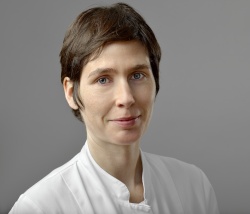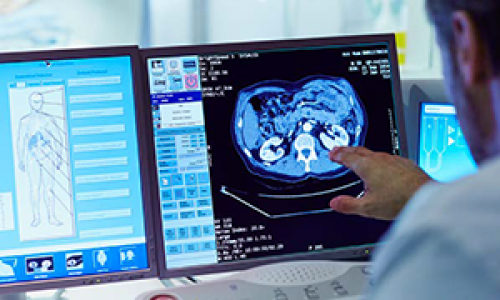Neuroradiology
More freedom, more responsibility
She is a neuroradiologist, professor, researcher and now the Medical Director of the Department of Neuroradiology at Dresden University Hospital. Her objectives are ambitious – be it in patient care, research or teaching. Professor Jennifer Linn MD wants to increase the quality of care, drive breakthroughs in research, ignite enthusiasm in students for their future profession and last, but not least, ensure job satisfaction for her team. Dr Linn is a rare breed: next to Professor Ulrike Ernemann, currently she is only the second woman in Germany to be a medical director of neuroradiology.
Report: Chrissanthi Nikolakudi

As Head of Neuroradiology at Carl Gustav Carus University Hospital Professor Jennifer Linn has gained a much cherished opportunity to shape and further develop the neuroradiology department. ‘As resident your responsibilities are limited to a certain area and you don’t have to consider the entire department,’ Linn explains. 'More freedom, however, also means more responsibilities and a greater willingness to negotiate compromises, particularly with regard to personnel and budget decisions: Technical but above all human resources are limited. The challenge I have to meet is to deliver top quality. That’s quite a tightrope walk.’
She does not intend to rest on laurels her predecessors earned. The Dresden neuroradiology department is ISO-certified, patient care is considered very good and across the board referring physicians are satisfied. ‘Although at a certain level improvements become more and more difficult, my overarching aim is to drive quality assurance, diagnostics and speed,’ Linn explains. She knows that a hospital is always only as good as the staff. Increasing job satisfaction, ensuring quality education and a positive workplace climate – for her these are much more than empty phrases: ‘I want my team members to know that they can rely on me.’ Why is that important? ‘You can reach for the sky but when the people around you are dissatisfied, when you don’t manage to create enthusiasm, you will fall flat on your nose pretty quickly,’ she explains her philosophy.
With all these mundane tasks will research get short shrift? Absolutely not, Professor Linn is adamant. On the contrary: Expanding the department’s and her own research work is top priority. ‘The research profile of the neuroradiology department in Dresden can be sharpened. Whilst, in the past, the institute participated in four large multi-centre studies, I intend to increase the number of studies initiated and performed by the department itself,’ Linn promises. She will continue and expand the team’s research focus.
Her predecessor, Professor Rüdiger von Kummer, was an expert in major ischaemic strokes; Linn is bringing her specialisation to Dresden: cerebral microangiopathies – pathologies of the small vessels supplying the brain, which cause strokes. ‘The significance of these pathologies as stroke triggers is not yet firmly anchored in many physicians‘ minds since they do not cause major strokes. I would like to change that in our facility,’ Linn explains. After all, from a certain age upwards almost everyone suffers some kind of microangiopathies. The small vessels are damaged by risk factors such as age, arterial hypertension or diabetes mellitus. ‘For a long time we have considered this as a ‘normal’ ageing process. However, more recent research has shown that microangiopathies can indeed cause stroke symptoms and above all impair cognitive capabilities.’ Jennifer Linn wants to tale a closer look at vascular dementia and find out more about the connections between vascular conditions and dementia: ‘At this point, we do know that these diseases are connected but a lot of research remains to be done.’
The professor estimates that 60 to 70 percent of her students are female and most of them will indeed get a degree. However, at senior resident level only about 20 percent are women. Albeit, Professor Linn points out that this is not a healthcare-specific problem. She is also the mother of a one-year old child and knows that it can be very difficult to find reliable childcare during working hours. ‘Many women who face these difficulties give up too quickly. I firmly believe that children and a professional career can go hand in hand.’
PROFILE:
Jennifer Linn gained her doctorate from the Institute for Neurosciences at Munich’s Technical University and habilitation at Ludwig Maximilian University, Munich, with a thesis on the differentiation of haemorrhagic stroke using modern cross-sectional imaging methods. In 2011 Professor Linn was invited to work at the Department of Neuroradiology of Johns Hopkins University in Baltimore and in the same year received the Kurt Decker Award of the German Society of Neuroradiology. After leading the MRI research group at the Department of Neuroradiology, Ludwig Maximilian University Hospital, Munich, since 2009, last October she was appointed Medical Director of the Department of Neuroradiology at Carl Gustav Carus University Hospital in Dresden.
29.04.2015





